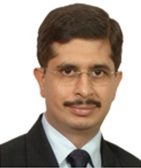Bell Curve has lost it’s relevance in today’s age of instant gratification
 Shourya is the Executive Vice President & Head – HR for Aptech Limited and all its subsidiary companies.
Shourya is the Executive Vice President & Head – HR for Aptech Limited and all its subsidiary companies.
Having worked with reputed multinational companies such as Aditya Birla Group, Firstsource, General Mills, General Electric and HSBC Global Resourcing, he brings with himself a rich and varied experience in setting up, stabilizing and integrating business HR operations, successfully leading organization-wide change initiatives from conceptualization to execution and building teams and organizations in high-growth, people-centric organizations.
For more information on Aptech, visit
www.aptech-worldwide.com
In an exclusive interview with GroSum Performance Management eMag, Mr. Shourya Chakravarty, EVP, HR, Aptech stated that Bell Curve has lost its relevance in today’s age of instant gratification
How important is Performance Management in today’s organizations?
Performance Management has always been critical to organizations through the appraisal process & its long term perspective will soon be a thing of the past. The new age employee belongs to a “Here & Now” generation with a need for instant gratification. They want to know “What’s In it for me today” & thus short term focus on performance is very important. For all that is said, the organization’s core objective is profit maximization & thus performance management will have to strike a balance & put emphasis on achieving short term targets to be considered relevant to employees.
How does Performance Management actually help?
In our organization, while we set goals, we also give employees a lot of independence to figure out ways to achieve these. There is a strong focus on Sales & a healthy competition between employees who carry Sales quota to deliver. Each month, they await the dashboard that updates everyone’s monthly achievement. So, it’s no longer about achieving one’s quota but also checking how one is comparing with the rest. At the end of the year, a select group of achievers is rewarded with a foreign destination holiday that culminates with recognition at the Gala Awards night.
All the while we ensure that the process does not breed envy and is taken in the right spirit by all. It so happens that employees aspire to qualify for this elite club of achieves that thus pushes them to try harder the next year.
What are the key gaps in current industry practices in managing employees’ performance?
At some leading Multinationals, I have observed that the process sometimes defeats the purpose. For example, deadlines are hard to set & employees who miss these do not get a second chance. It is necessary to realize that Performance Management is for employees & their development/contribution is what drives the company’s success. So, certain flexibility needs to be incorporated.
In a generation that thrives on instant gratification, force ranking them through a Bell Curve to dole out increments is no longer relevant. Monetary rewards should take into consideration many aspects of which current employee performance is just one.
Again, Senior Management/CEO support is critical to the success of a Performance Management program. A lot depends on how the CEO perceives HR as a function & its contribution to the strategic objectives of the organization. Organizations, where performance management fails, need to start investigating from the top & the messages they send to the rest of the workforce.
What makes a really effective P.M. programme? Any best practices to share.
Communication is so critical in performance. The work environment should encourage a constant feedback mechanism between employees, their supervisors & peers. This makes employee performance a “social” outcome rather an individual burden.
Performance should also look beyond individual goals & employees achieving them. We should bring in aspects like a sphere of influence & cross-functional exposure that really help in pulling the organization along. After all, we would rather want employees to not feel satisfied after completing their projects but look to help others to complete as well.
Performance Management should focus on strengths & help employees develop these, rather than weaknesses. Fundamentally, I believe that if you encourage & make someone feel confident of his strengths, he is the most capable person to go & address his weaknesses. After all, anything permanent can only happen from within & someone who has the strength to accept his weaknesses is the best person to try to overcome these.